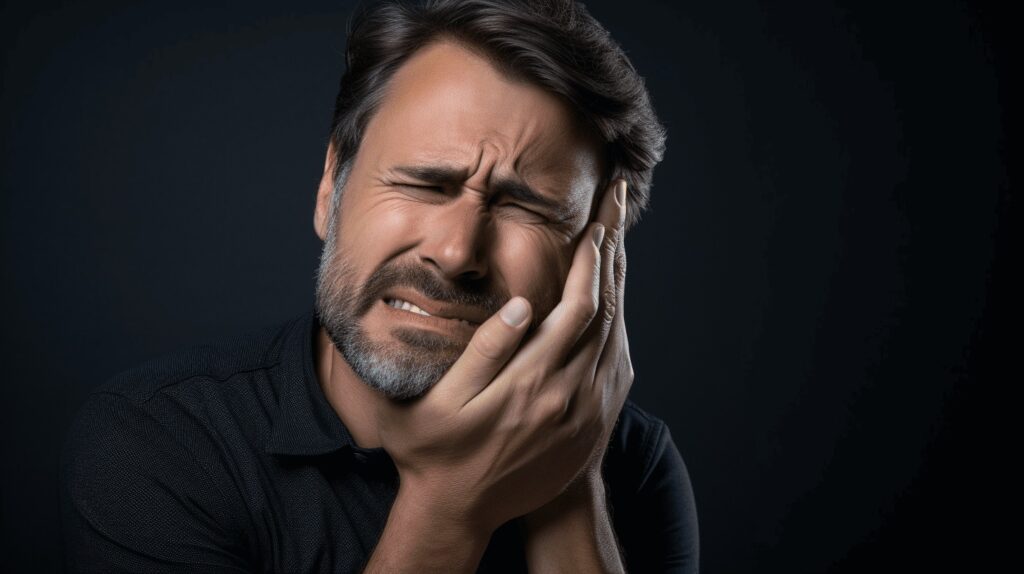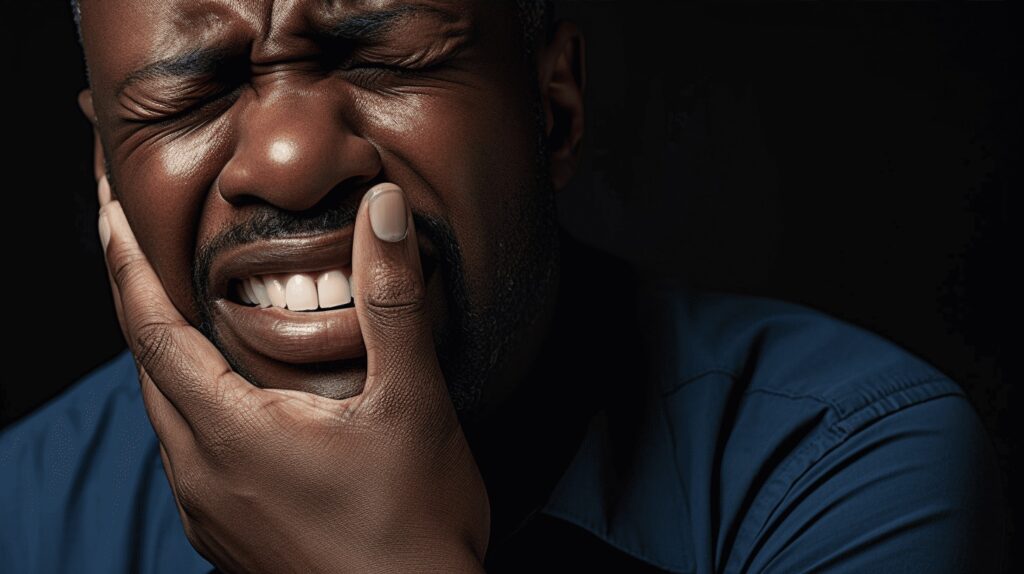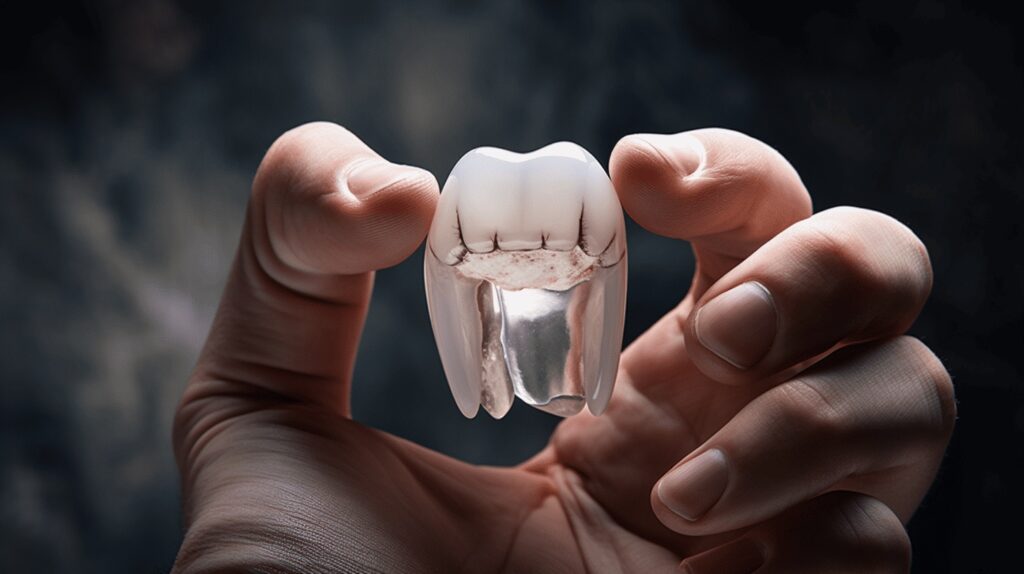Dental emergencies can arise unexpectedly, and knowing how to respond when they strike is crucial.
Whether it’s a severe toothache, a knocked-out tooth, or broken braces, our smile is a vital part of us that deserves immediate attention when compromised. In this article, we’ll delve deeper into the reality of dental emergencies and explore how we can tackle these situations effectively.
You don’t have to be a health care professional to be panic-stricken by dental emergencies— the pain and the potential long-term dental harm are enough to set off alarm bells. But, don’t you worry! We’re going to arm you with pragmatic approaches on managing dental emergencies.
Plus, we’ll highlight preventive measures that not only nip potential dental issues in the bud but also save that precious smile of yours.
Stay tuned—as we journey together through this unanticipated reality of oral health—a realm that demands our attention more than we ever thought possible.
Let’s embrace the importance of healthy gums and teeth, and learn how to protect our pearly whites against unforeseeable mishaps. Because, after all, nothing beats a bright, pain-free smile! 😊
Table of Contents
The Statistical Reality of Dental Emergencies
An ordinary day can quickly transform into a nightmare if a dental emergency occurs. Whether it’s a severe toothache, an unexpected accident, or a knocked-out tooth, the pain and distress compel immediate attention. However, have you ever stopped to consider the broader statistical reality of these emergencies? An exploration of the figures reveals a surprising and concerning portrait of dental emergencies in America.
Dental-related Emergency Department Visits
With over 2 million dental-related emergency department visits recorded in 2018, the issue is far from insignificant. These numbers translate into a staggering rate of 615.5 visits per 100,000 population. It’s safe to say that our emergency departments are saturated with patients seeking immediate dental care, a testament to the pervasiveness of these health crises.
Lost School Hours due to Emergency Dental Care
The consequences of dental emergencies extend beyond pain and discomfort. There’s also an educational cost. Every year, a whopping 34 million school hours are lost as children are pulled out of their classrooms to seek unplanned dental care. This disruption has wide-reaching effects on their academic performance and overall development.
Emergency Room Visits for Preventable Dental Conditions
What’s even more disheartening? Many of these emergency room visits, which make up 1.15% to 2.5% of all ER departures, originate from preventable dental conditions. It indicates an urgent need for improved preventative care and dental health education.
Cost of Atraumatic Dental Pain
Atraumatic dental pain, or pain that occurs without an obvious injury or accident, is a common source of distress. The economic burden? It’s hefty — costing upwards of $2.4 billion every single year.
Dental Emergency Prevalence Among Adults
Examining the adult population, we find that dental emergencies are a fairly common occurrence, with 12% of American adults having experienced at least one. It’s a clear call-to-action for everyone to be prepared on when to seek immediate dental treatment.
Emergency Dental Visits Among Children
Children aren’t spared either. Particularly those aged 5-9, record the highest number of emergency dental visits per 10,000 people. For our young ones, the experience can be especially terrifying, further highlighting the importance of nurturing good dental hygiene habits from a young age.
Pain and Trauma in Dental Cases
Lastly, let’s talk about the human side of these dental emergencies. Statistics show that one in five people will face dental trauma in their lifetime. That’s not a small number. The associated pain and fear are sentiments we wish no one would endure.
In the face of these figures, we recognize the gravity of these situations and extend our caring hands towards those in need. Dental emergencies are not just numbers. They are real-life scenarios, distressing moments that ask for our understanding and prompt action. Knowing the statistics, let’s strive to turn the tide, focusing on preventative care, education, and seeking immediate help when necessary.
Managing Dental Emergencies: Essential Skill for Dentists
When it comes to dental emergencies, time is always of the essence. As dentists, our ability to swiftly and accurately diagnose the situation can make all the difference between alleviating pain and potentially worse consequences. But fear not – let’s delve into some key insights on how to manage dental emergencies and shine a beacon of hope in distressing situations, providing effective solutions for emergencies.
In this fast-paced, dynamic profession, we encounter a myriad of dental emergencies, ranging from toothaches, broken braces, to knocked-out teeth. So how do we remain unflappable amidst this storm of unpredictable emergencies? Here are some critical steps we need to master:
- Ensuring calm: Functioning as an emotional thermostat in the exam room steadies the patients and provides crucial thinking space.
- Swift diagnosis: The first step towards solving any problem is identifying it. From visually examining the situation to using technology such as X-rays, we amass the information needed to plan our next steps.
- Deciding the path forward: Based on the diagnosis, you may either fix the issue immediately, refer the patient to a specialist, or schedule a follow-up procedure.
On-the-spot decision-making and problem-solving are pivotal. According to the General Dental Council, it’s vital to never compromise the health and safety of our patients. Being up to date with the most effective solutions for emergencies can be a lifesaver in such situations.
That’s not all, though. Having empathy and understanding when dealing with dental emergencies go a long way in assuaging patients’ anxieties. Isn’t it comforting to know that we, as dentists, aren’t just tackling physical issues, but also easing emotional distress?
Remember, as dental professionals, we’re not just here to fill cavities or clean teeth; we’re a vital link in a patient’s healthcare chain. Having these skills isn’t just recommended; it’s crucial to our profession. Embracing this reality and delivering high-standard care is what sets us apart in handling dental emergencies.
Preventive Measures for Dental Emergencies
We’ve all been there— that unexpected toothache that brings excruciating pain, that unexpected chip or crack in a tooth from a sports event. Instead of waiting for this unexpected shock, how about we discuss some preventive measures for dental emergencies?
Importance of Daily Oral Hygiene
First on our list is maintaining daily oral hygiene. Now you may be wondering – how does it fit into the picture? Well, robust daily oral hygiene is like the invisible shield protecting you from potential oral health threats, preventing issues which could cause dental emergencies in the future.
Here’s a quick guide on how to wield this “shield” optimally:
- Brushing is your first defense. Brush at least twice a day using a soft-bristled toothbrush. Circular brush strokes covering every tooth surface are most effective.
- Flossing — It’s not just an addition to brushing, but a crucial practice that helps remove plaque and food particles stuck between your teeth. This can help prevent cavities and gum disease (the anime villains of your dental story!)
- Mouthwash — Think about it like the clean-up crew after a long day’s work, reaching spots you could miss while brushing or flossing.
Use of Mouthguards in Contact Sports
Have a fondness for contact sports 🏈⚽🏀? We definitely don’t want to curb your enthusiasm but it’s essential to mitigate risks that come along with these adrenaline-pumping activities.
In this context, mouthguards come to the rescue. They act as a cushion in your mouth, absorbing shock and preventing fractures or dislodged teeth during sports activities.
Regular Dental Checkups
Lastly, let’s not forget regular dental checkups. Understanding the saying “Prevention is better than cure,” we suggest scheduling a visit to your dentist every 6 months. This helps in early identification of any potential issues before they transform into painful emergencies.
For more details on maintaining good oral health, head over to our page about Good Oral Health – Best Practices & Tips that we’ve put together on “Maintaining Good Oral Health.”
Armed with these preventive strategies, dental emergencies can be averted, sparing us unwanted pain and distress. Remember, your teeth are an integral part of your smile 😄, and taking good care of them is one of the best investments you can make!
Let’s keep our smile in its perfect form, shall we?
Steps to Handle Dental Emergencies
Contacting Your Dentist
As we always suggest, the first step in any dental emergency should always be to dial up your dental practitioner.
- They are the experts equipped with both the knowledge and tools to handle any dental calamities.
- It doesn’t matter if it’s a severe toothache or a dislodged tooth; your dentist will be able to provide immediate suggestions and plan for an emergency visit if necessary.
Consider saving your dentist’s number on speed dial or placing it somewhere easily accessible. That way, you’ll have it ready during any dire straits.
Steps If a Tooth is Knocked Out
Ever found yourself in the unfortunate situation where a tooth gets knocked out? Worry not! It’s not all doom and gloom.
- Quickly pick up the tooth by the crown (the white part), not by the root.
- If the tooth is dirty, rinse it gently with milk, keeping the brief contact with water at a minimum. Remember, don’t scrub or clean the tooth with soap, it might damage the root.
- Try to substitute the tooth back into the socket, if feasible. If not, proceed to the next step.
- Immersed the tooth in milk or a product that bears the “ADA Accepted” seal. If none are at hand, just place the tooth in the mouth (between the cheek and gum)
The quicker these steps are taken, the higher the chances that the tooth will survive. It’s important to head over to the dentist immediately after handling the tooth with care.
Utility of a Dental Emergency Kit
In an ideal world, we would love to have a dental emergency kit. It’s similar to the standard first-aid kit, but with a slight twist. Everyday items that could become lifesavers include:
- Gauze
- Small container with a lid
- Acetaminophen (Not aspirin, as it can slow clotting)
- Dental floss
First Aid Steps for Dental Emergencies
Finally, we come to dental first-aid. Here’s what you need to know:
- Rinse your mouth with warm water.
- Apply pressure on the affected area with gauze to stop bleeding.
- For any visible swelling, use a cold compress.
- Avoid aspirin or other painkillers which might interfere with clotting.
Remember, these steps can only provide temporary relief. Consulting with your dental practitioner is crucial for permanent solutions and recovery. Preparation and quick action are your best allies when facing dental emergencies.
Book your free consultation with us online or call (323) DENTIST (323-336-8478) today.
Frequently Asked Questions
1. What are common dental emergencies?
Common dental emergencies include toothache, knocked-out tooth, broken or chipped tooth, abscessed tooth, and dental trauma.
2. What should I do if I have a toothache?
If you have a toothache, rinse your mouth with warm saltwater, floss to remove any trapped food particles, take over-the-counter pain relievers, and visit a dentist as soon as possible.
3. How do I handle a knocked-out tooth?
In case of a knocked-out tooth, hold the tooth by the crown, rinse it gently with water, try to reinsert it into the socket, if not possible, keep it moist by placing it in milk or saliva, and see a dentist immediately.
4. What should I do if I break a tooth?
If you break a tooth, rinse your mouth with warm water, apply a cold compress to reduce swelling, save any broken pieces if possible, and seek dental care promptly.
5. How can I prevent dental emergencies?
To prevent dental emergencies, maintain good oral hygiene, use protective mouthguards during sports activities, avoid biting hard objects, and visit your dentist regularly for check-ups and cleanings.









